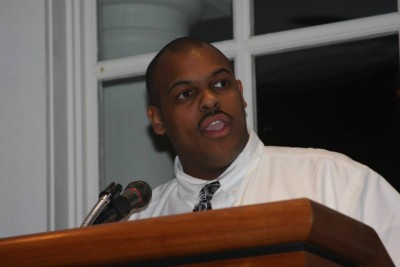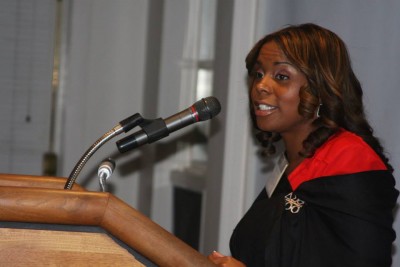
“I hope in the not-too-distant future, young African Americans, Latinos and other minorities won’t have to question whether they can one day be a teacher, because the answer will be standing at the front of their classrooms,” said Mark Jenkins Jr. in front of 80 school administrators and Neag School of Education’s faculty, students and alumni at the fifth annual “Celebrating Diversity in Education” dinner.
Jenkins is “one of the African American males who make up less than two percent of the nation’s public school teachers.” Currently pursuing his master’s degree in the Integrated Bachelor’s/Master’s (IB/M) Teacher Education Program, Jenkins decided to make a difference by bringing the support and guidance he received from Neag School to his students.
The change Jenkins hopes to see reflects a growing concern in diversity in the teaching workforce nationally. “In over 40 percent of public schools there is not a single teacher of color,” said Thomas C. DeFranco, dean of the Neag School.
“Researchers found that teachers of color have higher performance expectations for students from their own ethnic group,” DeFranco explained, “and students of color tend to have higher academic, personal, and social performance when taught by teachers from their own ethnic groups.”
“Teachers of color are not only role models, but also an important part in improving of the lives of these children,” DeFranco continued.
Coordinated by Ann Traynor, academic advisory center director at the Neag School of Education, the Diversity Dinner brought together Neag faculty, alumni and students, school administrators, and high school minority students who show interests in pursuing a teaching career.
“We decided to have a dinner celebrating diversity as part of our efforts to encourage students of color to become teachers, and also to create a networking platform for future and current students, Neag faculty and alumni, and K-12 school administrators,” Traynor recalled how the event came about five years ago.

Santosha Oliver, a UConn alumna with a doctorate in genetics and developmental biology shared her story of being the first-generation college student from an African American family. Raised by her mother and grandmother who were both factory workers, Oliver recalled how her grandmother became a lifelong learner without the opportunity to finish high school or get a college degree.
“Looking back at what my grandmother encountered and achieved in her life, I knew I had no excuse not to be well educated as much as I can,” Now a proud Director of STEM Education for Manchester Public Schools, Oliver believes that her classroom was “a unique experience” for most of her students, because “they are learning about science from a teacher that looks like them, has a Ph.D., and perhaps has overcome some of the very obstacles that they face.”
“Each year I attend the Diversity Dinner I am inspired by the guest speakers who are enthusiastic and committed to teaching and student learning,” said Gayle Allen-Green, principal of Bulkeley High School (BHS), with whom the Neag School has partnered to support the BHS teacher preparation studies program since 2009. The program’s curriculum is modeled after Neag’s nationally-acclaimed teacher preparation program. It is the state’s first dedicated teacher preparation studies program with a focus on recruiting, supporting, and preparing high school minority students to pursue careers in education.
“Diversity in teacher educations is very important in a global society we face today. Our teaching force should be more reflective of the student population we serve,” said Allen-Green, “Our collaboration with the Neag School allows our staff to be exposed to the most recent trends in education, including Common Core, technology integration and parent/teacher relationship building. It also provides our students with opportunities to frequently visit UConn and learn more about teacher education.”
Shantel Honeyghan, Jamaica-born and a resident of Hartford, CT, is a BHS teacher preparation academy alumna. “I had attended the dinner annually starting from my junior year in high school, anticipating being accepted into the program in the years to come,” said Honeyghan. “It was a great experience to finally be a part of the Neag family and see more minority students interested in becoming teachers.”
Four high school students from BHS teacher preparation academy attended the dinner. Didier Narcisse, a senior class president said he hoped to study music education at UConn and become a music teacher in the future.
Representatives from the Connecticut Alliance of Regional Educational Service Centers were also at the dinner. Working with the RESC’s Pathways to Teaching Program, Neag School invites high school minority students to UConn campus yearly. Their most recent visit saw 80 young men of color from six Connecticut high schools attending a one-day panel session in Storrs. The students were able to interact and make connections with UConn faculty and alumni, as well as listen to stories from minority role models including Dr. Jeffrey O.G. Ogbar, UConn’s vice provost for diversity and Aida Silva, an undergraduate admissions counselor and a first-generation college student herself.
“One of our ways to increase the number of minority teachers in Connecticut is to make sure we have more students of color in our own teacher education program,” said Marijke Kehrhahn, associate dean of the school, who organized UConn’s hosting of the recent RESC Alliance conference.
“We try to create as many opportunities as we can for students to visit UConn, let them know the importance of a college education and hopefully encourage them to become a teacher in the future,” she continued.
To Dorothea Anagnostopoulos, recently appointed executive director of teacher education, the Diversity Dinner was the highlight of the Neag School’s “multi-pronged initiatives” in increasing diversity in teacher education. “It’s a matter of bringing small pieces together, by working with existing school partners, organizing more mentor programs for high school minority students and bringing in new staff for minority teacher recruitment outreach. Theses all contribute to continuously moving our program forward.”
One of Anagnostopoulos’ missions is to create an urban teacher preparation program in the school. “A lot of people from urban and high-need districts go into teaching because they see it as a way to improve the lives of the community they are from. We need to make sure our program best serves and clearly aligns with their purpose-driven goals.”
Two Neag junior students Giselle Garcia, majoring in secondary mathematics, and Estephani Orellana, majoring in elementary education, were recognized as the newest Hearst Scholars at the dinner, joining Jonathan Brown and Justis Lopez. Hearst scholars, promising students of color in the teacher preparation program, are selected from each cohort and provided with a scholarship each year. Hearst Scholars participate in diversity outreach efforts organized by the Neag School.
Inspired by the speeches at the dinner, Anagnostopoulos added: “What’s remarkable is how the event brought together people who are committed to increase opportunities to quality education for diverse students. We should constantly remind ourselves there are more to be done to reduce the opportunity gap and keep refining our program to a higher caliber.”
 Facebook
Facebook
 Twitter
Twitter
 LinkedIn
LinkedIn
